
| This is the fourth of the Persian pages continuing the rendering in English of the mystical thought of Khawaja Hafiz Shirazi. From this page onward they are all Ghazals. These are longer poems which have musically oriented form in which each full line ends with the same word. This for the most part we have not attempted to reproduce - preferring to use the archaic form of rhyming couplets more familiar in the Masnevi of Mevlana Rumi and others. In preparing these re-translations we are especially indebted to Maryam Moghadam of Shiraz may Hafiz Saheb reward her for the same. The translations used as a basis for these renditions are those of Wilberforce-Clarke, Peter Avery, and Paul Smith. They have been edited with reference to the original Parsi. |
 |
| The Poetry of Khawaja Hafiz Shirazi |
The numbering of Wilberforce-Clarke are indicated as W-C. |
Ghazal 1 (W-C 1)
O server of love-wine, pass round and be offering the cup,
In the first place love looked easy, but problems came up,
Desiring that the musk pod of that hair knot, the breeze might open,
So much blood, for that curl of hair, the lover’s hearts have given.
In this staging-post, from the beloveds what joy can come our way,
For the camel’s bell tells us - ‘Gather your gear, get underway!’
Colour the prayer mat with wine, if the guide should tell you to,
For knowledge he has of the Way, and what you need to do.
Fearful indeed is the wave and whirlpool in that dark night;
Those light burdened shore-huggers know what of our plight?
By doing things for my fulfilment, only notoriety I got;
What can remain secret when gatherings talk such a lot.
Hafiz, if presence you want, from the beloved don’t be absent,
When you get your desire, on its way the world should be sent
O server of love-wine, pass round and be offering the cup,
In the first place love looked easy, but problems came up,
Desiring that the musk pod of that hair knot, the breeze might open,
So much blood, for that curl of hair, the lover’s hearts have given.
In this staging-post, from the beloveds what joy can come our way,
For the camel’s bell tells us - ‘Gather your gear, get underway!’
Colour the prayer mat with wine, if the guide should tell you to,
For knowledge he has of the Way, and what you need to do.
Fearful indeed is the wave and whirlpool in that dark night;
Those light burdened shore-huggers know what of our plight?
By doing things for my fulfilment, only notoriety I got;
What can remain secret when gatherings talk such a lot.
Hafiz, if presence you want, from the beloved don’t be absent,
When you get your desire, on its way the world should be sent
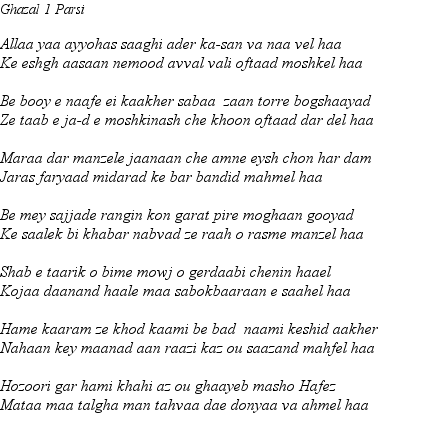
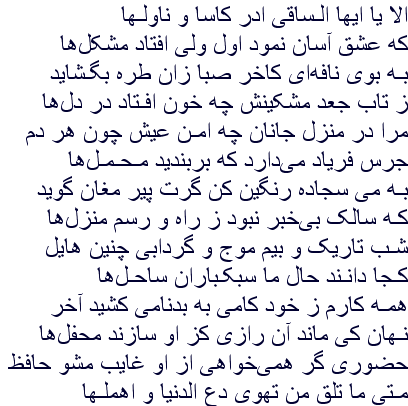 |
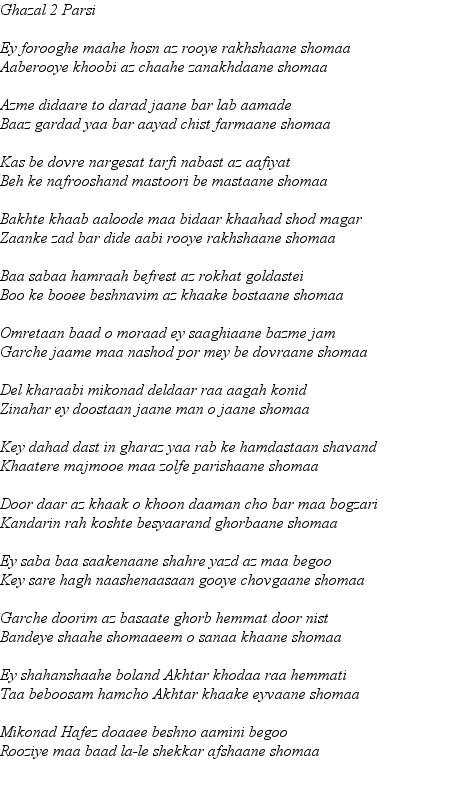
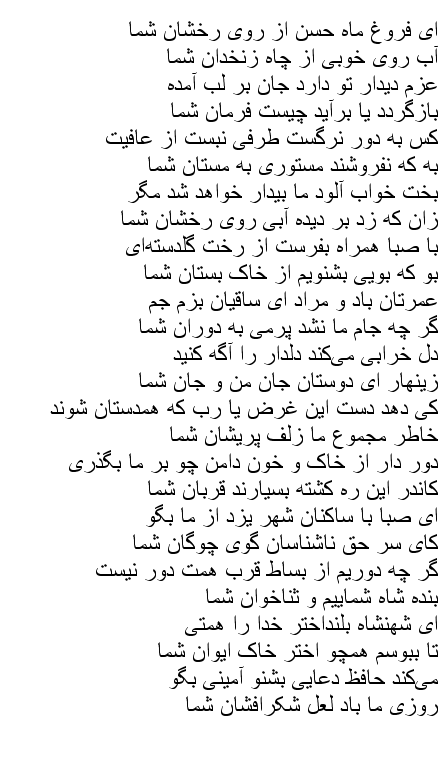 |
Ghazal 2 (W-C 2)
From your face’s light the moon’s beauty shines true,
From the dimple in your chin beauty gets all its virtue.
My life has reached my lip on its way out, but wants to see you;
Should it go out or stay in, I need you to say what I should do.
From the revolving of your narcissus-eye no one got an easy ride,
No point to sell a cover to those drunk on you, they cannot hide.
Our sleepy fortune may become more eager and alert, I daresay
Because a drop, from your glistening cheek, into its eye did stray
Along with the breeze send me, from your cheek, roses in a posy,
Your fragrance, from the rose garden’s dust, may then come to me.
O Sakis of the feast of Jam - we wish long life be enjoyed by you,
What though our cup is not filled with wine, as your rounds you do!
My heart’s engaged in wrecking; better let its owner know,
Truly my friends, by my soul and yours, I tell you it is so.
O Lord, when will our ever present desire, attain to its realisation,
And in our gathered heart be your hair’s scattered profusion?
Draw back your robe from our dust and blood, when you pass by,
For there are many victims sacrificed to you, that on this way lie.
O breeze, to the people of Yazd convey our message with verve,
May truth deniers’ heads be the ball in your chaugan’s curve.
Near we may not be, actually, but near we are in our ardour,
The slave of your king we are, so we also praise your splendour.
O king of kings and star on high, for God‘s sake, a boon;
So this star may kiss the dust of your heavenly palace soon.
Hafiz makes a short prayer; hear it, and then say, ‘May it be so!’
‘Let my daily bread be what your sugar-sprinkling lip does bestow.’
From your face’s light the moon’s beauty shines true,
From the dimple in your chin beauty gets all its virtue.
My life has reached my lip on its way out, but wants to see you;
Should it go out or stay in, I need you to say what I should do.
From the revolving of your narcissus-eye no one got an easy ride,
No point to sell a cover to those drunk on you, they cannot hide.
Our sleepy fortune may become more eager and alert, I daresay
Because a drop, from your glistening cheek, into its eye did stray
Along with the breeze send me, from your cheek, roses in a posy,
Your fragrance, from the rose garden’s dust, may then come to me.
O Sakis of the feast of Jam - we wish long life be enjoyed by you,
What though our cup is not filled with wine, as your rounds you do!
My heart’s engaged in wrecking; better let its owner know,
Truly my friends, by my soul and yours, I tell you it is so.
O Lord, when will our ever present desire, attain to its realisation,
And in our gathered heart be your hair’s scattered profusion?
Draw back your robe from our dust and blood, when you pass by,
For there are many victims sacrificed to you, that on this way lie.
O breeze, to the people of Yazd convey our message with verve,
May truth deniers’ heads be the ball in your chaugan’s curve.
Near we may not be, actually, but near we are in our ardour,
The slave of your king we are, so we also praise your splendour.
O king of kings and star on high, for God‘s sake, a boon;
So this star may kiss the dust of your heavenly palace soon.
Hafiz makes a short prayer; hear it, and then say, ‘May it be so!’
‘Let my daily bread be what your sugar-sprinkling lip does bestow.’
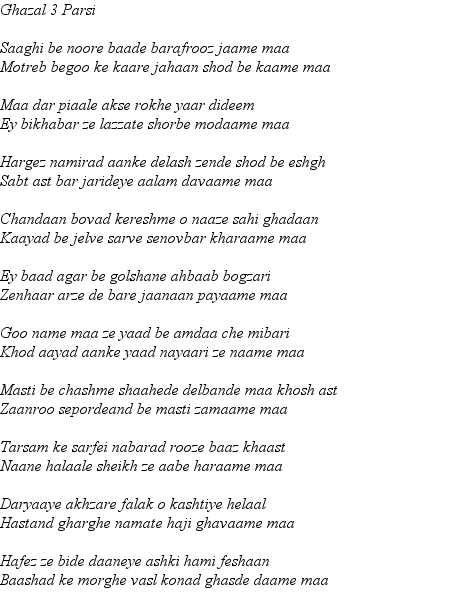
Ghazal 3 (W-C 3)
O Saki, this cup of ours light up with that wine of yours,
O maestro, sing of how we are tuned to fortune’s course.
Reflected in the wine, the true beloved’s face we can see;
O you who don’t know what joys in wine-drinking there can be!
One, whose heart is alive with love, does not die ever;
It is written on the universal tablet that we live forever.
Those sly glances and alluring forms, charm; but are nothing,
When that cypress-shape, swaying like a pine, comes strolling.
O kind wind, if you should pass by the beauties’ garden,
Be sure that, to those lovely ones, this message is given.
Say, "Why do you forget our name so deliberately,
Anyway one day time will wipe it from your memory.”
In the sight of the beloved our intoxication is pleasing,
So, into drunken hands our heart’s reins, they are giving.
I doubt the cleric’s lawful bread, on the Day of Awakening,
Will be of more benefit than the forbidden wine I’m drinking
The sphere’s vast green celestial ocean and the crescent shaped -
Ship of the moon. In the blessing Hajji Qavam gave, both drowned1.
O Hafiz; let your copious tears flow all night long,
Maybe the bird of union will be ensnared before long.
O Saki, this cup of ours light up with that wine of yours,
O maestro, sing of how we are tuned to fortune’s course.
Reflected in the wine, the true beloved’s face we can see;
O you who don’t know what joys in wine-drinking there can be!
One, whose heart is alive with love, does not die ever;
It is written on the universal tablet that we live forever.
Those sly glances and alluring forms, charm; but are nothing,
When that cypress-shape, swaying like a pine, comes strolling.
O kind wind, if you should pass by the beauties’ garden,
Be sure that, to those lovely ones, this message is given.
Say, "Why do you forget our name so deliberately,
Anyway one day time will wipe it from your memory.”
In the sight of the beloved our intoxication is pleasing,
So, into drunken hands our heart’s reins, they are giving.
I doubt the cleric’s lawful bread, on the Day of Awakening,
Will be of more benefit than the forbidden wine I’m drinking
The sphere’s vast green celestial ocean and the crescent shaped -
Ship of the moon. In the blessing Hajji Qavam gave, both drowned1.
O Hafiz; let your copious tears flow all night long,
Maybe the bird of union will be ensnared before long.
 |
Ghazal 4 (W-C 4)
Come, Sufi, the mirror of the cup shines brightly;
So it’s possible to see the ruby colour clearly.
The secret inside the veil, ask from the profligate drinker,
For, of this state, the eminent jurist is not the possessor.
The Anka is not a prey that anyone can ensnare;
Withdraw your net, you will find only wind there;
At time’s feast a jar or two will do, then let it be
Don’t be greedy, perpetual pleasure there won’t be.
Try to drink the bliss of the present moment, for when it’s gone,
As Adam had to leave the garden asylum – you must move on.
Youth passed O heart, and no rose was gathered,
In maturity, acquiring wisdom should be preferred.
Only to serve do your servants wait at your entrance;
O Khwaja does not service merit a passing glance?
Of Jamshid’s cup Hafiz is the disciple, so convey O breeze,
This morning’s salams, to that master of Jam, please.
Come, Sufi, the mirror of the cup shines brightly;
So it’s possible to see the ruby colour clearly.
The secret inside the veil, ask from the profligate drinker,
For, of this state, the eminent jurist is not the possessor.
The Anka is not a prey that anyone can ensnare;
Withdraw your net, you will find only wind there;
At time’s feast a jar or two will do, then let it be
Don’t be greedy, perpetual pleasure there won’t be.
Try to drink the bliss of the present moment, for when it’s gone,
As Adam had to leave the garden asylum – you must move on.
Youth passed O heart, and no rose was gathered,
In maturity, acquiring wisdom should be preferred.
Only to serve do your servants wait at your entrance;
O Khwaja does not service merit a passing glance?
Of Jamshid’s cup Hafiz is the disciple, so convey O breeze,
This morning’s salams, to that master of Jam, please.

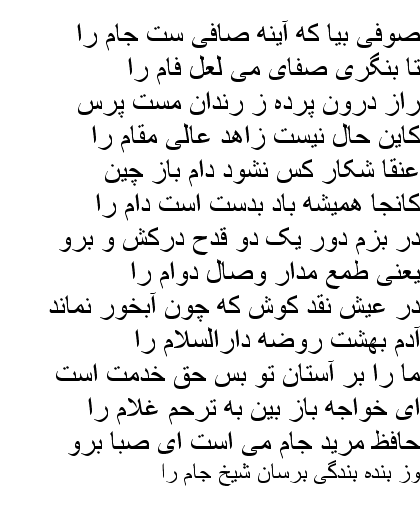 |
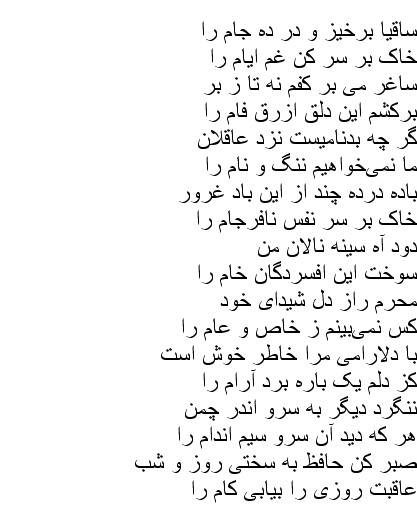 |
PAGE 4
Ghazal 6 (W-C 6)
O God! From out of my own control my heart is slipping,
Men of the Way! What pain, if love’s secret it’s revealing
Our boat is becalmed; O fair wind, you we require.
To see again the face of intimate friends we desire.
For ten short days the illusory favours of the spheres beguile,
Friend, acts of kindness to friends take as a boon meanwhile.
Last night, in the rose’s company, the bulbul sang happily of wine,
Saying, “O give a drink to wake these drunken friends of mine.”
O owner of wonders, in gratitude for your own situation,
Show sympathy to the poor dervishes without any ration.
Ease in the two worlds is contained in two words only;
Affection (shown to friends); courtesy (to the enemy).
I have no access to the street of honour and reputation;
If this has not your approval, then change our situation.
The bitter wine is called ‘the ‘Mother of Woes’, by the Sufi,
But to us, even in a virgin’s kiss nothing sweeter can there be.
In hard times to make merry with wine and what pleases us,
Is the elixir that makes a seeming beggar of a Croesus.
See the secret of Alexander’s mirror in the wine cup,
Showing all that on earth is going on, or will come up.
Breathing new life into us are the lovely Parsi speakers,
O Saki, pass this news to older pious Persian revellers.
Not of his own will did Hafiz don this wine-soaked dress,
O spotless pure Sheykhs we may need you to make our excuses.
O God! From out of my own control my heart is slipping,
Men of the Way! What pain, if love’s secret it’s revealing
Our boat is becalmed; O fair wind, you we require.
To see again the face of intimate friends we desire.
For ten short days the illusory favours of the spheres beguile,
Friend, acts of kindness to friends take as a boon meanwhile.
Last night, in the rose’s company, the bulbul sang happily of wine,
Saying, “O give a drink to wake these drunken friends of mine.”
O owner of wonders, in gratitude for your own situation,
Show sympathy to the poor dervishes without any ration.
Ease in the two worlds is contained in two words only;
Affection (shown to friends); courtesy (to the enemy).
I have no access to the street of honour and reputation;
If this has not your approval, then change our situation.
The bitter wine is called ‘the ‘Mother of Woes’, by the Sufi,
But to us, even in a virgin’s kiss nothing sweeter can there be.
In hard times to make merry with wine and what pleases us,
Is the elixir that makes a seeming beggar of a Croesus.
See the secret of Alexander’s mirror in the wine cup,
Showing all that on earth is going on, or will come up.
Breathing new life into us are the lovely Parsi speakers,
O Saki, pass this news to older pious Persian revellers.
Not of his own will did Hafiz don this wine-soaked dress,
O spotless pure Sheykhs we may need you to make our excuses.
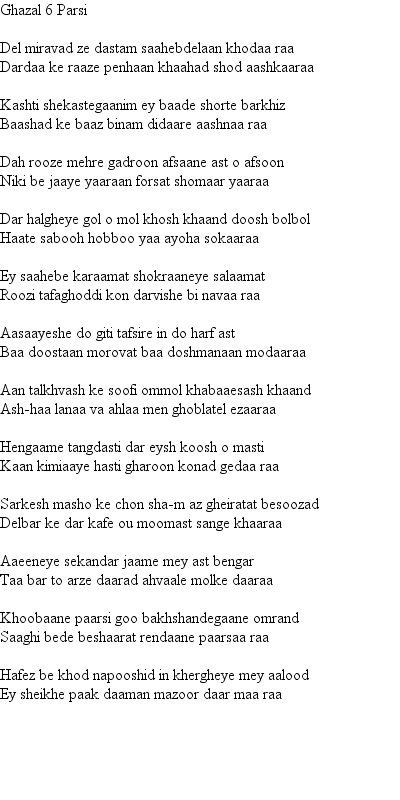
 |
______________________________________________________________________________________________________________________
______________________________________________________________________________________________________________________
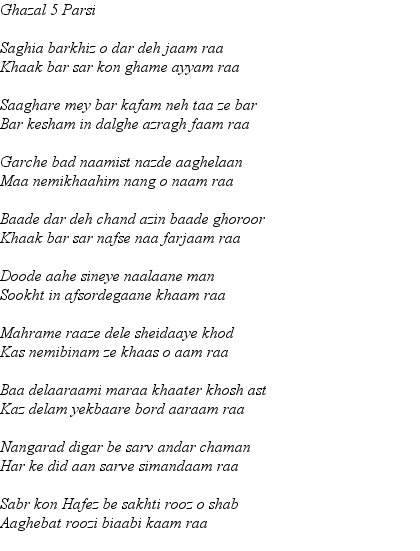
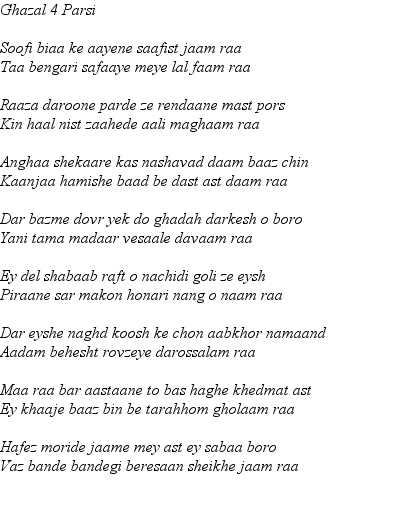
______________________________________________________________________________________________________________________
______________________________________________________________________________________________________________________
______________________________________________________________________________________________________________________
under construction
pages >>
<<<<<<<<<< Hafiz Shirazi >>>>>>>>
< Shems-i-Tabri >
| THE COLLECTED GHAZALS OF HAFIZ The verses here are a taster of the 4 volumes that have now been produced by Beacon Press. Below is a review of the first volume by Siraj Elschot. The Collected Ghazals of Hafiz; vol. 1, with the original Farsi poems, English translation & notes by Jamiluddin Morris Zahuri with Maryam Moghadam; ill.; 355 p.; 2017; Beacon Books; www.beaconbooks.net; Manchester. This is the opening verse of the Divan of Hafiz: O server of love-wine, pass round and be offering the cup, In the first place love looked easy, but problems came up. Another verse in the same ghazal is very well known: Colour the prayer mat with wine, if the Magian Pir tells you to, For knowledge he has of the Way and what you need to do. Jamiluddin Morris Zahuri has presented the Divan of Hafiz into these modern English verses. Maryam Moghadam has provided the original Persian text. She has also taken care of the transliteration of the Persian text, so that someone not knowing Persian gets enabled to recite every poem. Another verse of the same ghazal receives this rendition by Jamiluddin: Fearful indeed is the wave and whirlpool in that dark night; Those lightly burdened shore-huggers know what of our plight? The Divan of Hafiz is considered to be a master’s piece. It is not for nothing that the Sufis have described Khwaja Shamsuddin Muhammad-i-Hafiz-i-Shirazi as Lisaan-ul-Ghaib (Tongue of the Unseen) and Tarjumaan-i-Asraar (Interpreter of Hidden Secrets). Jamiluddin and Maryam have presented the complete Divan of Hafiz in 4 volumes, the first volume of which has now been published. The introduction by Jamiluddin contains a description of the life of Hafiz. It also mentions that the Divan has been used as a means of prognostication. A short commentary is given regarding the symbols to be found in the poetry of Hafiz, while Hafiz receives a place among the stars by briefly comparing him with several other important Sufi poets. The first translation of a poem of the Divan in the West was done in Latin in the 17th century, while a century later Sir William Jones has been responsible for the first English translation of a ghazal of Hafiz. Joseph von Hammer-Purgstall published a complete translation of the Divan in 2 volumes in German in 1812-13. It received immediate attention by Goethe, who even went as far as describe Hafiz as holy! Lieut.-Col. H. Wilberforce Clark has been the first one to translate the complete Divan into English (1891). The value thereof is that he treats Hafiz as a Sufi initiate. Clark’s translation demonstrates an extensive knowledge of Sufism. It is a pity however that his prose translation is far removed from the lyrical beauty of the original Persian text. The literal translation is so heavily interpolated with notes that it is very hard to read. That is why Jamiluddin with his rendition of the Divan in elegant English verse has done modern readers a great favour. He has added notes and a glossary to explain specific Sufi concepts, but has done so in a restrained way in order to let the text speak for itself. He is also responsible for the illustrations that add to the beauty of these collected ghazals of Hafiz. Siraj |